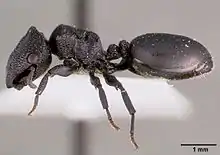| Cephalotes rohweri | |
|---|---|
 | |
| Cephalotes rohweri worker | |
| Scientific classification | |
| Domain: | Eukaryota |
| Kingdom: | Animalia |
| Phylum: | Arthropoda |
| Class: | Insecta |
| Order: | Hymenoptera |
| Family: | Formicidae |
| Subfamily: | Myrmicinae |
| Genus: | Cephalotes |
| Species: | C. rohweri |
| Binomial name | |
| Cephalotes rohweri (Wheeler, 1916) | |
Cephalotes rohweri is a species of arboreal ant of the genus Cephalotes, characterized by an odd shaped head, and the ability to "parachute" by steering their fall if they drop off of the tree they're on. Giving their name also as gliding ants.[1][2]
Characteristics
Cephalotes rohweri is most commonly found in the Sonoran Desert, where it establishes nests in abandoned beetle cavities in Palo Verde trees (Parkinsonia florida or Cercidium floridum).[3] They feed primarily on the pollen of these trees, and thus have little or no need to venture to the ground. However, they are capable of consuming other foods, and it has even been suggested that they may occasionally forage on the ground to do so. Colonies range in size between ~50-200/300 individuals, and frequently have multiple reproductive queens. Because brood require several months to mature into adults, queens cannot adjust the ratio of soldiers to workers quickly enough to adapt to changing threats. Therefore, an effective strategy of soldier (major) deployment has evolved to maximize survival.[4]
References
- ↑ Latreille, P.A. (1802). Histoire naturelle, generale et particuliere des crustaces et des insectes. Vol. 3. F. Dufart, Paris. 467 pp. PDF
- ↑ Yanoviak, S. P.; Munk, Y.; Dudley, R. (2011). "Evolution and Ecology of Directed Aerial Descent in Arboreal Ants". Integrative and Comparative Biology. 51 (6): 944–956. doi:10.1093/icb/icr006. PMID 21562023.
- ↑ Species: Cephalotes rohweri. (n.d.). AntWeb. Retrieved December 15, 2013, from http://www.antweb.org/description.do?genus=cephalotes&name=rohweri&rank=species&project=allantwebants
- ↑ Creighton, W. S., & Nutting, W. L. (1965). The Habits and Distribution of Cryptocerus Rohweri Wheeler (Hymnoptera: Formicidae). PSYCHE, March, 59-63.
External links
 Media related to Cephalotes rohweri at Wikimedia Commons
Media related to Cephalotes rohweri at Wikimedia Commons